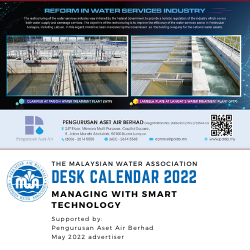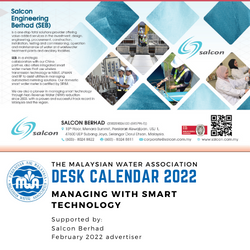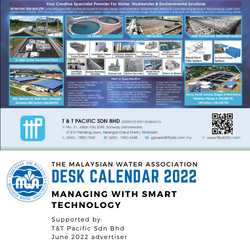IWK gains world award for sewerage services

MALAYSIA has always been blessed with abundant water with an average annual rainfall of around 2,500mm.
In addition, data from the National Water Services Commission shows that each Malaysian uses an average 220 litres (L) of treated water a day compared to 140L in Singapore and 165L as recommended by the United Nations.
This means that more wastewater is being produced from water-based activities either in domestic or commercial premises.
Last month, the country’s sewerage service achieved a milestone when Indah Water Konsortium Sdn Bhd (IWK) won the Professional Development Award 2021 by the International Water Association (IWA) on May 24.

Ching hopes that IWK will continue its path towards achieving premier status in the international arena
Environment and Water Ministry (KASA) deputy secretary general (water and sewerage) Dr Ching Thoo Kim said generally, the connected sewerage services coverage in main cities have reached more than 80%, while the remaining 20% are being served by traditional systems such as septic tanks, pour-flush and latrines, to name a few.
KASA looks into the environmental and water value, as well as the sustainability of these assets to propel the country’s development.
“The ministry places importance on the comfort of the people so that we can work towards building national development.
“This can only come through knowledge transfer and up-skilling of serving individuals, and the IWA Professional Development Award conferment to IWK proves that it is a working method,” he said.
Consistently Evolving
Malaysia has gone through a series of evolution in its sewerage system and management to arrive at where it is today due to the effort from the ministry, regulator and operator.
This combined tremendous effort was not only poured into the growth of technology, but also talent management and operations.
“With close to three decades worth of experience, the up-and-coming talents in IWK continue to thrive and inherit the knowledge and technical skills from the yesteryears.
“At the same time, the ministry has considerably evolved in this area, and the new talents have supplanted the generations before,” Ching said.
As Malaysia continues to develop, the sewerage system evolves in tandem with the needs of the people.
Sewage treatment plants are mechanised to ensure efficiency, but the human talents need equal skill and knowledge entrenchment which IWK succeeded in elevating its people.
IWK established its training centre, commonly known as the Indah Water Training Centre (IWTC) in 2006, for technical training on sewerage systems that focuses on theory and practice for the staff of IWK and the wider public, local and international.
In 2019, IWK became the host and organiser for a few international organisations, with a total of 150 participants from May until November.
Its training was customised to international delegates from Kandy City Wastewater Management Project (Sri Lanka), PT Kogas Driyap Konsultan (Indonesia), SNV Netherlands Development Organisation (Netherlands) and Urban Management Centre (India).
IWK also worked together with the Bill and Melinda Gates Foundation and continued to provide knowledge transfer opportunities to many deserving delegates from around the world.
So far, it has designed and customised sessions for over 40 organisations, 6,800 participants and seven countries all over Asia and Africa.
In the local scene, IWTC conducted 195 sessions of local training which involved the participation of internal staff, government agencies, sewerage industry players, consultants, developers, as well as safety and health officials.
This year, IWTC was rebranded to Asian Sewerage Training, Research and Innovation Centre of Excellence (ASTRICE), in line with IWK’s strategy on developing knowledge, skills and competencies to meet current and future business and industry demands.
Future-proofing Talents
ASTRICE will continue to build on capacity building of professional knowledge, skills, aptitude and attitude, with an aim to be a regional hub for knowledge exchange for the sewerage industry.
The talent management aspect initiated by IWK aligns with the contextual investment by the government under the 11th Malaysia Plan to improve sewerage services, approximately more than RM1.2 billion to modernise the sewerage services.
On behalf of KASA, Ching hoped that IWK will continue its path towards achieving premier status in the international arena.
“We will continue to prioritise this aspect of the water cycle as sewerage management directly impacts our nation’s economic growth.
“We have also given the mandate to shift our focus on purely managing sewerage services toward a circular economy,” he said.
Against this background, KASA established the Sustainability Journey 2030 for IWK to produce 1,500 MLD (million litre per day) of reclaimed water by 2030 as a strategy for a sustainable water approach.
These plans are designed to create a lasting environment for the country’s ever-growing communities to live in.
Unfortunately, Ching expressed that there is a lack of appreciation among the public on sewerage service as it is rendered behind the scenes, unlike other utilities where the results of the service are tangible.
“That being said, wastewater treatment is an essential part of the environment and our wellbeing, and the public should be more well-aware of the potential it brings to our society in the economic sense as well as public health,” he added.
A Positive Boost

We create valuable opportunities for employees to improve within departments, says Ahmad Johnie
For IWK chairman Ahmad Johnie Zawawi, the award fuels IWK’s commitment to serving the nation as it is a testimony to the dedication demonstrated by its employees and is an outcome of IWK’s two-pronged approach of skill and academic upscaling.
“We create valuable opportunities for employees to improve within departments through education and skill programmes, and to rise up as future leaders.
“This recognition comes in the middle of our ongoing employee upscaling to IWK’s goal of having highly-skilled workers by 2030 through growth in competencies, such as leadership, creative and innovative skills,” he said.
IWK programmes of academic and skill upscaling include the Designing Elegant Solutions for Innovation, Growth and Navigation, or DESIGN, programme; Education Assistance Programme; research opportunities for postgraduate programmes; and collaboration with the Department of Skills Development to equip employees with the Malaysian Skills Certificate.
Ahmad Johnie said IWK’s daily operations were disrupted last year, which has taught the company to adapt in order to become more resilient and productivity-driven.
“It has been our fundamental principle when we undertook the vital task of maintaining and operating the sewerage system to ensure that Malaysians today and in the future will be able to enjoy a clean and healthy environment.
“This important responsibility of maintaining more than 7,000 sewage treatment plants and over 20,273km of sewer line is only made possible thanks to the 3,500 talents that we have nationwide,” he concluded.
by HARIZAH KAMEL / pics courtesy of IWK

https://themalaysianreserve.com/2021/06/17/iwk-gains-world-award-for-sewerage-services/







